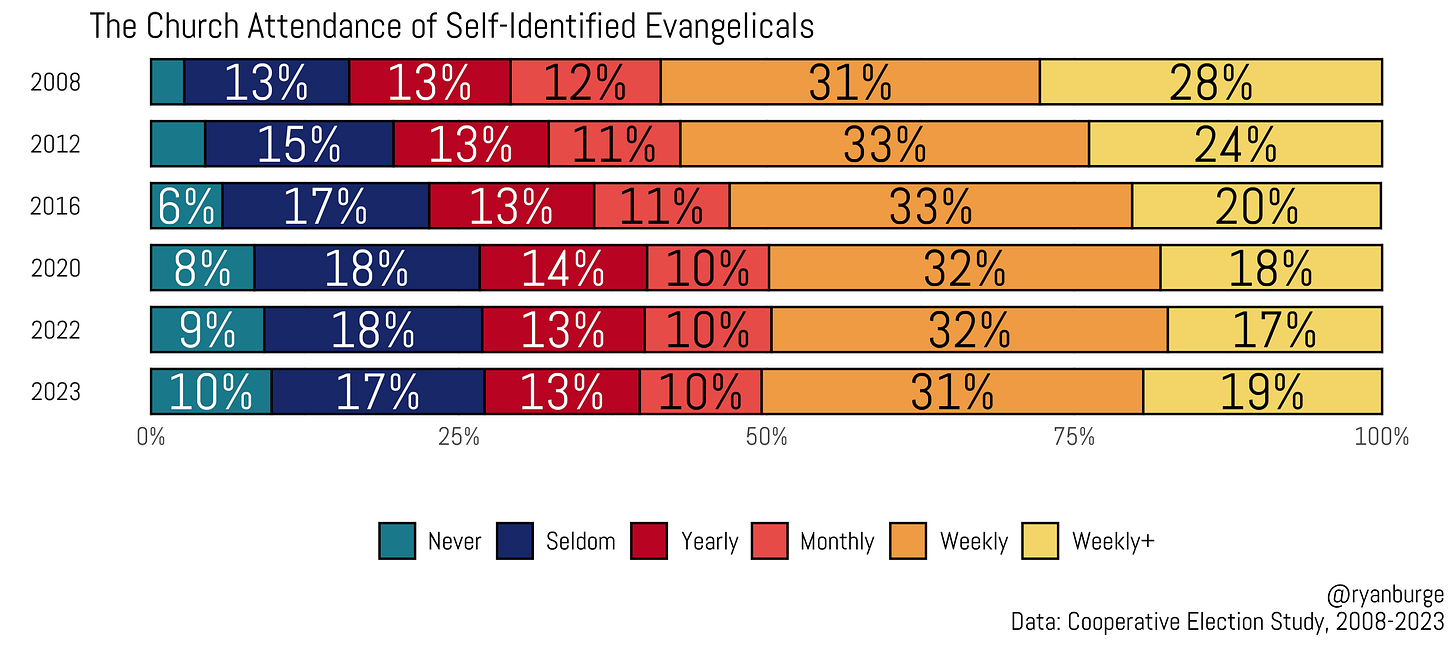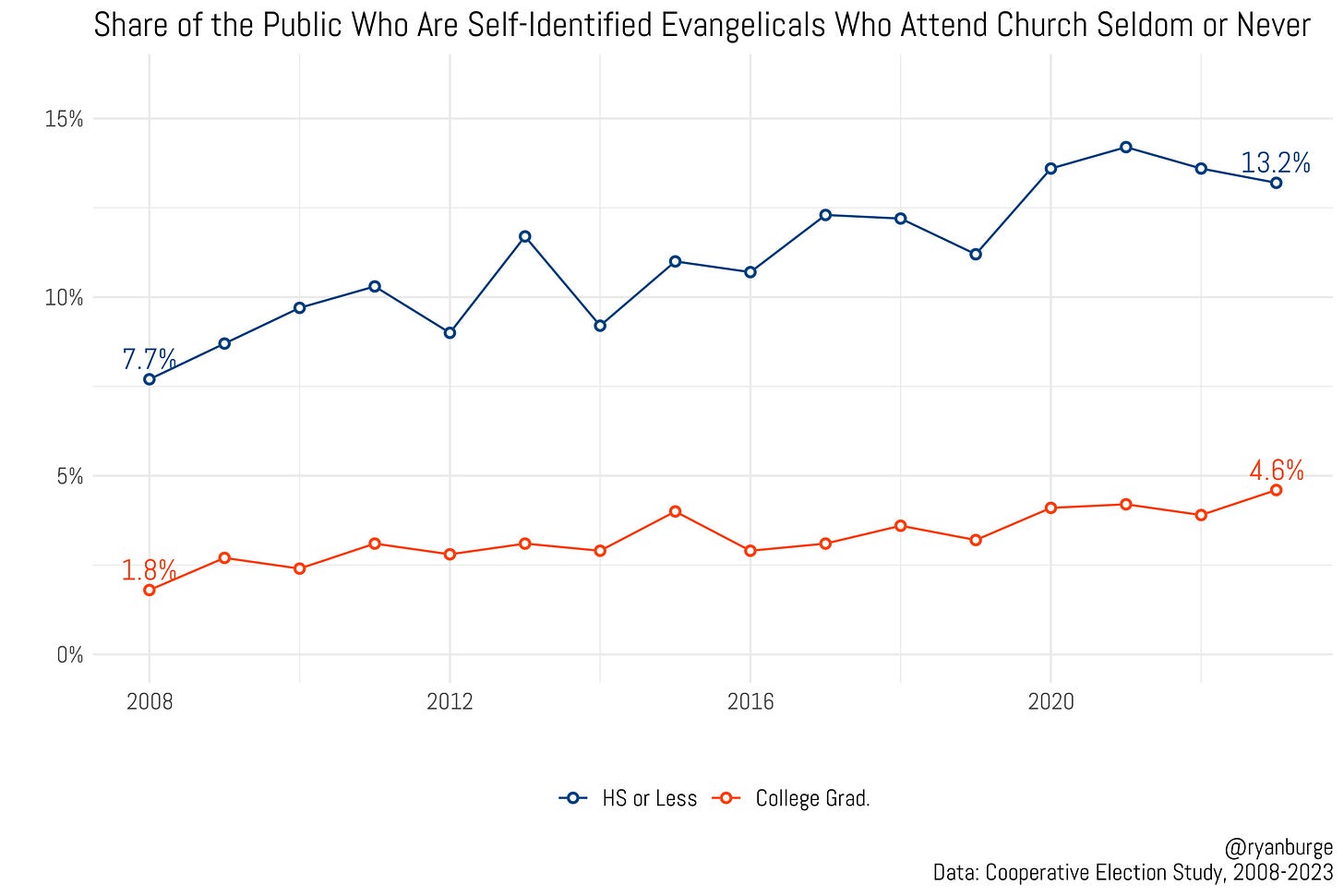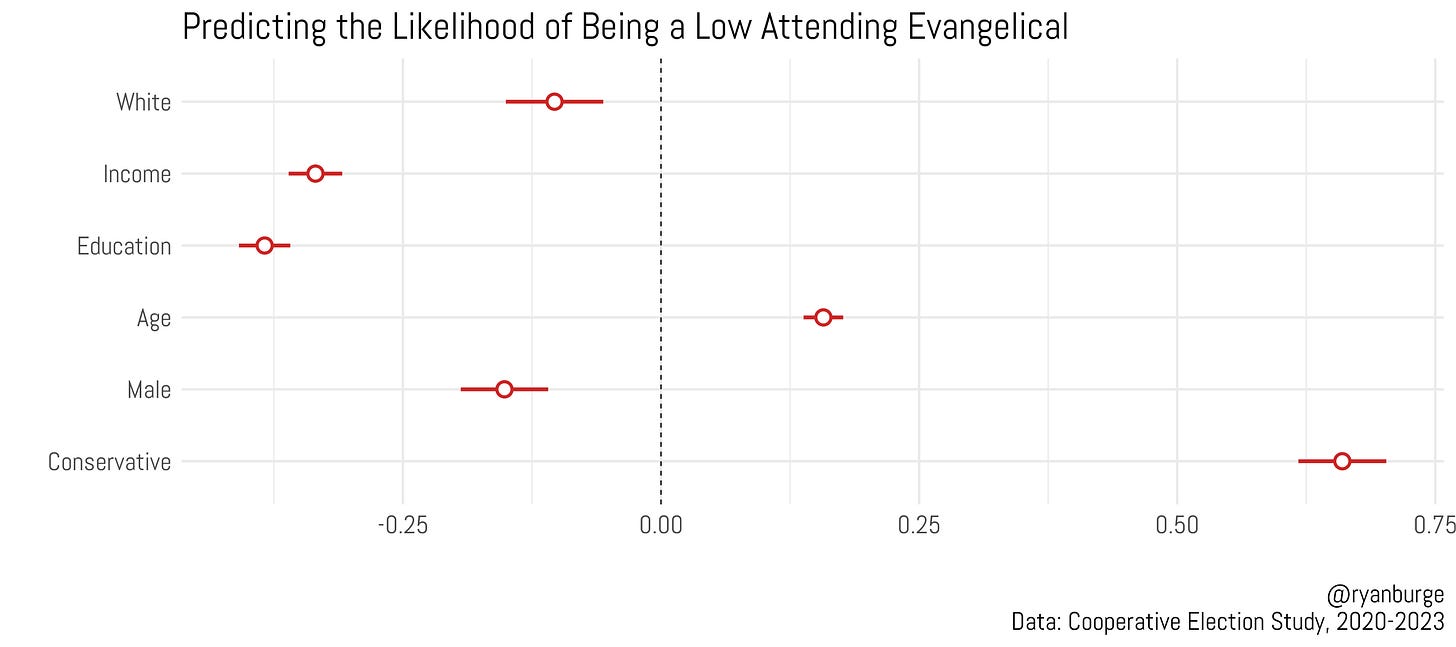'I'm An Evangelical, But I Rarely Go to Church'
When Religious Belonging and Religious Behavior Don't Align
In the last couple of months, I have been doing several speaking engagements around the country. I talk about some of my previous work in The Nones, but also some of the analysis that I have been putting together for my new book with Brazos that will come out in early 2026. I try to do about 45 minutes of graphs and then I turn it over to the audience for Q&A.
I have had several instances where someone has started their question by stating, “I’ve read something somewhere about this idea that there are a growing number of evangelicals who don’t go to church very much, what’s up with that?” What’s funny is that they don’t know that I’m probably the source of that piece of information. I think it’s going to be on my tombstone someday: “Ryan was a devoted husband and father. He also changed how we think about the word evangelical.” I guess there are worse ways to be remembered.
Let me point you to the graph that got all this started. It’s a really simple premise. The Cooperative Election Study asks everyone who takes their survey, “Do you consider yourself a born-again or evangelical Christian or not?” The only two response option are yes and no. There’s also the pretty standard question about religious attendance. Here’s how self-identified evangelicals answered that question about religious behavior over the last fifteen years.
In 2008, just 3% of self-identified evangelicals reported never attending religious services. Another 13% described their religious attendance as ‘seldom.’ In contrast, a significant majority of evangelicals (59%) said that they attended church at least once a week. In the 2023 data, those numbers look a lot different. The share of evangelicals who never attend has more than tripled to 10% and then an additional 17% attend ‘seldom’. Meanwhile, the share who are weekly attenders now stands at exactly 50%.
In 2008, 16% were attending less than once a year. In 2023, it was 27%.
In 2008, 59% were attending at least once a week. In 2023, it was 50%.
But I do want to point something out from the prior graph. This is a phenomenon that occurred entirely between 2008 and 2020. If you look at the last couple of years of data, it’s almost exactly the same. The percentages deviate by just a single point in either direction. The rise of the low attending evangelical has abated, at least for now.
Here’s another way to look at this - it’s the share of the entire sample who said that they were evangelical and indicated that their religious attendance was ‘seldom’ or ‘never.’
In 2008, it was just 5% of the sample. But it jumped up quickly from there. By 2012, it’s fair to say that it was about 7% of the general population. It crept up slightly from there. By 2020, it was 9% of the sample and has basically sat there for the last couple of samples. Nine percent is a lot, by the way. For comparison - if you add up all the Orthodox Christians, Latter-day Saints, Jews, Muslims, Hindus, and Buddhists in the United States, it’s less than 9%.
The share of Americans who are mainline Protestants is 9.5% now. There are nearly as many evangelicals who attend church seldom or never.
I wanted to peek behind the curtain a little bit on this, though. I just didn’t have a really good understanding of what factors lead to someone saying that they are evangelical but not being an active member of a religious congregation.
Politics is a great place to start. I broke the sample down based on political ideology into liberal, moderate, and conservative. Then I tracked the share of each group who were low attending evangelicals over time.
In 2008, the gap between liberals and conservatives was pretty small. About 5.5% of conservatives were low attending evangelicals compared to 3.5% of liberals in the sample. Over time, the ideological gap continues to widen. By 2012, it was about 3.5 percentage points. By 2016, it was more than five points. In the data collected over the last couple of years, it’s grown into a chasm.
In 2023, 12.6% of conservatives are evangelicals who attend church seldom or never - that’s an increase of seven points since 2008. For liberals, the share who are low attending evangelicals was 4.5%. That’s an increase of a single percentage point from 2008. Remember, the ideological gap was two points in 2008. In 2023, it was eight percentage points. This is pretty compelling evidence that this phenomenon is being driven, in no small part, by politics - not religion.
But there could be other factors at play here. Education is another area to explore. It may be the case that college educated people have a better grip on the historical understanding of a term like evangelical. I broke the sample into those who went no further than a high school diploma and those who had earned at least a four year degree.
Okay, this is revealing. There’s always been a huge divergence in low attending evangelicals based on education. In 2008, there were almost no inactive evangelicals among the college educated set. It was just 1.8%. However, for the portion of the sample that stopped at high school, nearly 8% were low attending evangelicals.
It’s important to point out that both trend lines are pointing upward. Among the college-educated sample, 4.6% of them were evangelicals who attended seldom or never - an increase of 2.8 points over the time series. For those with a high school diploma, that percentage had climbed to 13.2%. That’s a total increase of 5.5 points. Nearly double the rate of those from the college educated group. There’s definitely something happening here when it comes to education and identifying as a low-attending evangelical.
Another arena worth exploring is race. I know that when we talk about evangelicals, it’s almost implied that we are focusing on white evangelicals. But here’s something that most people don’t know - Black Americans are significantly more likely to self-identify as evangelical on surveys. For instance, in 2022 - 44% of Black folks said that they were evangelical compared to only 25% of white and Hispanic adults.
But what happens when we throw the attendance question in the mix? Are Black people more likely to say that they are low-attending evangelicals?
In 2008, white respondents were more likely to report being an evangelical that attended seldom or never - that was 5.8% of their racial group. It was only 4.8% of African-Americans. Those two trend lines look very similar through 2015. Both percentages were increasing at about the same rate. However, in 2016 - the lines begin to diverge a bit. Now, the data indicates that Black people are more likely to be low-attending evangelicals compared to any other racial group. In 2023, 11.2% of African Americans both said that they were evangelical and they attended church less than once a year. It was 9% of the white sample and 7.4% of Hispanics.
Let’s throw a lot of these factors into a regression model now so that we can try and isolate what variables are the most predictive of someone being an evangelical who attends services seldom or never. I tested race, income, education, age, gender, and identifying as a political conservative.
There are a number of factors here that are predictive of someone being less likely to identify as a low-attending evangelical. The strongest predictors are education and income. As one becomes more educated they are less likely to say that they are an evangelical who seldom or never attends. The same is true of income - as it rises, the likelihood of being a non-attending evangelical falls. Both being white and being male also drive down this likelihood, too, but their impact is somewhat muted.
There are two variables in the model that drive up the possibility of being a low-attending evangelical. The first is age - older folks are more likely to fall into this category. I think part of it may be physical infirmity. There’s a term for this in the church world - a ‘shut-in’. However, the impact of age is not really that large.
What jumps out in this regression is being a conservative. That one single variable has more predictive power (in either direction) than all the other ones thrown in this model. Low-attending evangelicalism is a phenomenon driven largely by political concerns not theological beliefs.
But let me put this regression together a bit differently. This is an interaction between race and political ideology. Again, I am predicting the likelihood of identifying as an evangelical who attends church seldom or never.
There are two things that jump out to me from this analysis. The first is that there’s just this huge partisan divide when it comes to being a low-attending evangelical. In every single racial group, it’s conservatives who are much more likely to fall into this category and, in many cases, it’s not even close. For instance, it’s 2.5% of white liberals, and nearly 9% of white conservatives. In many cases, it’s twice the rate for conservatives as it is for liberals.
The other finding that jumps out is among the African-American sample. The ideological gap there is much smaller than it is for other racial groups. Nearly 6.5% of African-American liberals are evangelicals who attend church less than once a year. That’s at least four percentage points higher than any other liberal racial group. It’s pretty clear to me that Black community has a different understanding of what the word evangelical means.
One of the most frequent comments I get when I post this kind of data is something like, “You can’t be an evangelical who doesn’t go to church, that’s an oxymoron.” My response to that is simply this - you don’t own words. They are in the eye of the beholder. There are a whole lot of people (nearly one in ten Americans) who believe that they are evangelicals but they never or seldom attend a church service. It’s my job to try and understand this group, not just ridicule it.
Code for this post can be found here.











Many years ago —related to your final comment about words—I would have described evangelicals’ behavior as going to church a lot and actively trying to talk other people into doing the same. So when surveyed the person would answer yes, meaning they are a Baptist, perhaps. But for attendance there is no “not as much as I should” choice, it’s either stretch the truth or articulate or even confess to a contradiction between your values and who you really are. “Are you indifferent to Jesus giving his life for you on the cross?” Is not the question asked, but is the question heard.
Now, if you are just being asked if your family is Republican, you would be much more comfortable being frank.
I think changes in actual attendance are a part, but also changes in self-reporting also play a part.
For Black Christians, we have a different feel for the word evangelical. We use the more general "born again". The Jude 3 Project has done excellent work on this as well. You might find their data and conversations interesting